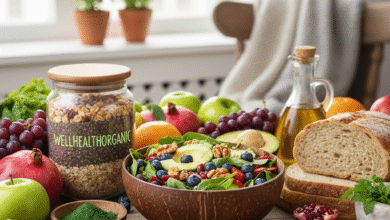Circulation and Cardiovascular Health: Tips to Keep Your Blood Flowing

The cardiovascular system, also known as the circulatory system, includes the heart, blood vessels, and blood. All elements work in unison to bring oxygen, nutrition, and hormones to cells throughout the body. Good circulation is vital with regard to overall health in that it assures these essential elements are delivered strongly and effectively throughout one’s body.
Poor circulation creates health-affecting conditions like heart disease, hypertension, and other cardiovascular diseases. This article explores the importance of healthy circulation, offers simple tips to promote cardiovascular health, and introduces natural remedies and supplements that can help improve blood flow.
Understanding Circulation and Its Importance
Circulation refers to the movement of blood through the heart and vessels. Systemically, the circulatory system can be separated into two circuits: a pulmonary circuit that carries blood from the heart to the lungs and back to the heart and a systemic circuit that delivers blood to the rest of the body.
Circulation helps to maintain healthy cardiovascular health within the body. Ongoing blood flow helps regulate body temperature, supports immune function, and efficiently transports hormones and nutrients.
The heart acts like a pump, forcing blood through these circuits to deliver oxygen-rich blood to tissues and organs and remove the products of waste, such as carbon dioxide. Poor circulation deprives cells of oxygen and nutrients, leading to symptoms like fatigue, tingling, swelling, and potential tissue damage.
Poor blood circulation can lead to severe health disorders that include peripheral artery disease, deep vein thrombosis, and stroke. Using the best supplements for circulation may help to have appropriate blood flow by infusing them into your daily routine.
Poor Circulation Signs
Poor circulation signs are important to recognize because one can now be able to take deliberate steps toward the improvement of cardiovascular health. Some common symptoms include:
● Cold hands and feet: Deficiency in blood flow can make the extremities feel cold.
● Numbness or tingling: Poor circulation can make one feel a pins-and-needles sensation.
● Swelling in the extremities: This may be because of inadequate circulation or build-up of fluid, especially within the legs and feet.
● Fatigue: When the blood in the body carries minimal oxygen, one feels worn out and sluggish.
● Muscle cramps or pain: Insufficient blood flow to muscles may cause such cramping, especially in the legs.
● Poor healing of wounds: Poor blood circulation may make the body take more time to heal cuts and bruises.
If you experience any of these symptoms, it’s important to consult a doctor to determine if they are related to a circulatory issue and to seek appropriate advice.
Tips to Keep Your Blood Flowing
Improvement in circulation doesn’t have to be complicated. There are plenty of ways to maintain good circulation and heart health, and most of them fit easily into your daily routine. Here’s how one can keep their blood flowing right:
Regular Exercise
One of the ideal ways to improve one’s circulation is regular exercise. Regular physical activity immediately activates the heart, which then makes it have a better ability to pump blood and oxygen through the body.Walking, jogging, swimming, and cycling are some of the best aerobic exercises that may help in keeping the cardiovascular organs healthy.
Strength training and stretching exercises facilitate circulation by promoting blood flow into the muscles and tissues. The activity recommendation is at least 150 minutes of moderate-intensity aerobic activity or 75 minutes of vigorous-intensity activity per week, or an appropriate combination of both, including muscle-strengthening activities on two or more days a week.
Stay Hydrated
Good circulation relies on proper hydration. Blood is around 50% water, and being well-hydrated allows blood to maintain an appropriate viscosity to flow smoothly through blood vessels.If you are dehydrated, then blood thickens, making it more difficult for your heart to pump blood through your circulatory system.
Drink plenty of water throughout the day to keep your blood flowing smoothly. The general rule is at least 8 glasses of water a day, and many factors can determine how much a person needs based on different activity levels and climate changes.
Eat a Heart-Healthy Diet
A diet rich in nutrients plays an important role in circulation and cardiovascular health. Foods that contain antioxidants, healthy fats, and fiber will protect the integrity of the blood vessels, reduce inflammation, and lower cholesterol levels.
Some of those foods to help increase circulation that you may want to add to your diet are:
● Leafy greens: Such as spinach and kale, include nitrates that keep blood vessels functioning properly.
● Fatty fish: Such as salmon and mackerel contain omega-3 fatty acids, which reduce inflammation and improve circulation.
● Nuts and seeds: Provide healthy fats and various nutrients that the heart requires.
The things to avoid include processed foods containing trans fats and a high level of salt, which can give rise to circulatory problems and increase the risk of cardiovascular diseases.
Quit Smoking
Smoking is considered one of the most dangerous habits people have that seriously affects cardiovascular health. It causes damage to blood vessels, oxygen levels in the blood decrease, and blood clots become more possible.
Chemicals in tobacco also help build up the so-called plaque in the arteries, a medical condition known as atherosclerosis. It brings about poor circulation, which may be the cause of a heart attack or stroke.
One of the best ways a person can help their circulation and heart health, in general, is to quit using tobacco. Circulation starts to get better within weeks, and over time, the risk of cardiovascular diseases decreases.
Manage Stress
Stress may act chronically to reduce circulation and generally adversely affect cardiovascular health through the elevation of blood pressure and constriction of blood vessels. If left unmanaged, long-term heart problems, including hypertension and heart disease, may be caused by chronic stress.
This can be achieved by practicing stress-relief techniques, including deep breathing exercises, meditation, yoga, and/or spending time outdoors in nature. Sufficient sleep and time to relax are equally important for the heart, allowing the body to recover and sustain favorable circulation.
Massage Therapy
Massage therapy can be define as a natural method of improving blood circulation. Various physical manipulations present in massage stimulate the flow of blood into the skin and muscles. Massage can further facilitate the release of muscular tension that may improve circulation by letting blood flow freely.
In conjunction with normal massage, self-massage can also be performed using foam rollers or handheld massagers to further help increase blood flow in areas that may feel tight or restricted.
Wear Compression Clothing
Poor leg circulation usually kept at bay with compression socks or hosiery. These different kinds of compression wear entail gentle pressure on the legs that allows blood to flow more effectively and prevents blood clots or swelling of the feet and legs.
Compression usually indicated for people who have to sit or stand for long periods, and for people suffering from varicose veins or chronic insufficiency of the venous system.
Consider Supplements for Circulation
Aside from lifestyle modifications, there are specific supplements that are beneficial to anyone in terms of enhancement in terms of circulation and heart health. These supplements contain ingredients that may enhance blood flow, reduce inflammation, and support healthy blood vessels. Some of the best supplements for circulation include:
● Omega-3 fatty acids: Found in fish oil, these reduce inflammation and improve blood vessel function.
● L-arginine: The amino acid increases nitric oxide production, allowing for the dilation of the blood vessels and a better flow of blood.
● Coenzyme Q10 (CoQ10): An antioxidant that supports heart health and energy production within cells.
● Ginkgo biloba: A botanical that encourages blood flow, particularly to the brain and extremities.
● Curcumin: Turmeric’s active constituent or ingredient provides anti-inflammatory effects beneficial to circulation.
Always consult your doctor or healthcare professional before introducing any supplements into your regimen, especially if you take medications or have underlying health conditions.
Conclusion
Good circulation is the key to healthy cardiovascular health and overall well-being. Apply yourself to improved blood flow and prevention of cardiovascular diseases by incorporating regular exercise, a heart-healthy diet, stress management, and natural solutions with the best supplements to improve circulation. By paying attention to habits that boost circulation, you’ll stay active, energized, and heart-healthy.
FAQs
1. What are the most effective supplements for circulation?
Omega-3 fatty acids, L-arginine, CoQ10, Ginkgo Biloba, and Curcumin are the most effective supplements for circulation.
2. Can poor circulation cause other health problems?
Yes, poor circulation can also lead to high blood pressure, heart disease, and peripheral artery disease, or PAD.
3. How can I tell if I have poor circulation?
Poor circulation is commonly characterize by cold hands and feet, numbness or tingling in extremities, swelling, muscle cramps, and fatigue.



